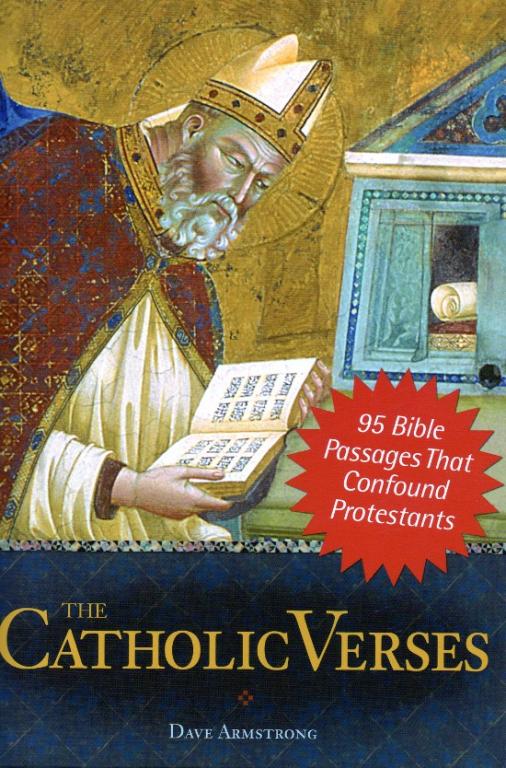
Catholics hold that Scripture is a fairly clear document and able to be understood by the average reader, but also that the Church is needed to provide a doctrinal norm (an overall framework) for determining proper biblical interpretation (specifically, for “vetoing” that interpretation which is erroneous because it leads to doctrinal error). Both Luther and Calvin underemphasize the guidance of the Church in understanding the Bible and assert the perspicuity, or clearness, and self-interpreting nature of Scripture, in terms of its overall teaching. Luther wrote:
[T]he contents of Scripture are as clear as can be . . . If words are obscure in one place, they are clear in another . . . to many people a great deal remains obscure; but that is due, not to any lack of clarity in Scripture, but to their own blindness and dullness. (The Bondage of the Will, II: “Review of Erasmus’ Preface”; ii: “Of the Perspicuity of Scripture”; from Packer, 71-72)
The apostles promulgated an authoritative tradition, . . . and they didn’t tolerate dissension from it . . . Once again, we find that an important Protestant distinctive is not biblical. So how do they attempt to explain this discrepancy? John Calvin, in his Commentaries, makes the following argument, pertaining to 1 Peter 1:20:
But the Papists are doubly foolish, when they conclude from this passage, that no interpretation of a private man ought to be deemed authoritative. For they pervert what Peter says, that they may claim for their own councils the chief right of interpreting Scripture; but in this they act indeed childishly; for Peter calls interpretation private, not that of every individual, in order to prohibit each one to interpret; but he shews that whatever men bring of their own is profane . . . the faithful, inwardly illuminated by the Holy Spirit, acknowledge nothing but what God says in his word.
I would like to apply Calvin’s principle and reasoning and by so doing, demonstrate that it ultimately reduces to absurdity and the utmost impracticality. Calvin (like Luther) despised the sectarianism that proliferated as a result of Protestant principles of authority, such as private judgment and the perspicuity of Scripture.
But neither seemed to see the obvious causal connection between their new principles and the rapidly growing number of Protestant sects. Luther claimed authority to overthrow a host of traditions that had been held for 1500 years. On what basis did he do so? In order to probe that issue and get to the bottom of it, one might construct a hypothetical dialogue between Luther [words in blue] and a Catholic critic that would run something like the following:
Luther (L): The Catholic Church is incorrect in beliefs a, b, c, and d.
Catholic (C): Why do you say that?
L: Because what you teach is unbiblical.
C: What gives you the authority to determine such a thing?
L: My authority is the Word of God, to which my conscience is captive.
C: We grant your sincerity, but not everyone agrees with your interpretation of Holy Scripture. Why should we believe you over against Church Tradition?
L: Because God has appointed me as the restorer of the gospel.
C: How do you know that? Why should we believe it?
L: God’s Word will make it manifest.
C: But what happens when your fellow Protestants disagree with you (e.g., Calvin, Zwingli, the Anabaptists)?
L: One must determine which view is more biblical.
C: How does one go about that, since your movement has no one leader, but rather, increasing numbers of sects who oppose each other on one or more grounds?
L: From now on I shall no longer do you the honor of allowing you—or even an angel from heaven—to judge my teaching or to examine it . . . Instead, I shall let myself be heard and, as St. Peter teaches, give an explanation and defense of my teaching to all the world — I Pet. 3:15. I shall not have it judged by any man, not even by any angel. For since I am certain of it, I shall be your judge and even the angels’ judge through this teaching (as St. Paul says [I Cor. 6:3] ) so that whoever does not accept my teaching may not be saved — for it is God’s and not mine. Therefore, my judgment is also not mine but God’s.
[actual words of Luther: Against the Spiritual Estate of the Pope and the Bishops Falsely So-Called, July 1522; Luther’s Works, 39, 239-299; quote from 248-249]
C: But Martin, don’t you see that when Calvin or Zwingli disagree with you, that they do so on the same grounds you claim for yourself, and that no one can figure out who is telling the truth unless there is a “court of final appeal”?
L: My truth is plain in the Bible.
C: That’s what Zwingli says too.
L: He is damned and out of the Church because he denies what has always been taught by the Church: that the body and blood of Jesus are truly present after consecration. It pains me that Zwingli and his followers take offence at my saying that “what I write must be true.” Zwingli, Karlstadt, and the other heretics have in-deviled, through-deviled, over-deviled, corrupt hearts and lying mouths.
C: The truth is that which has always been held by the Church (just as you yourself argued with regard to the Real presence in the Eucharist). Why, then, do you deny other Catholic doctrines that have an equally long history?
L: Because they are unbiblical.
C: According to whom?
L: According to the Bible.
C: As interpreted by you?
L: Yes, because, like I said already, whoever does not accept my teaching may not be saved — for it is God’s and not mine. Do we not read in the Old Testament that God commonly raised up only one prophet at a time? I say not that I am a prophet, but I do say that the more you despise me and esteem yourselves, the more reason you have to fear that I may be a prophet. If I am not a prophet, yet for my own self I am certain that the Word of God is with me and not with you, for I have the Scriptures on my side, and you have only your own doctrine.
[closely based on actual words from Luther’s tract, An Argument in Defense of All the Articles of Martin Luther Wrongly Condemned in the Roman Bull, 1521, in Jacobs, III, 13-14]
C: So we either accept your authority and word as the preeminent Bible expositor and deliverer of Christian truth of all time (and possibly a prophet), or so much the worse for us?
L: Yes, because God would have it so. You are obviously wrong and I must be right, because my teaching lines up with Scripture. You disagree with me not because of any lack of clarity in Scripture, but because of your own blindness and dullness.
And so on and so forth. It goes on and on like this, but the underlying assumptions of Luther are never proven; they are merely assumed. If a pope dared to proclaim such an unspeakably outrageous thing, Protestants would never accept it in a million years. But when Luther does it, it is accepted with blind faith that he is right and the Catholics are wrong, because “everyone knows” that Protestants are the “Bible people” and Catholics aren’t! They follow crusty, dead traditions of men which were condemned by Jesus, and are like the Pharisees. Etc., etc.
That’s what it always falls back on, because appeals to the Bible inescapably reduce to disputes over whose interpretation is correct. This is the circular nature of competing Protestant theologies. There is no way to choose between Calvin and Luther, except arbitrariness, irrational faith, or appeal to one’s own judgment.
Calvin has no more authority than Luther did. They both simply proclaimed it and people followed them. At the same time they railed against the Catholic exercise of authority, which was self-consistent, and far easier to trace back through history, in an unbroken apostolic succession (precisely as the Church Fathers argued for their authority in proclaiming true doctrine over against heresy).
This was the inner logic and dynamic of Luther’s new perspective, set forth at the Diet of Worms in 1521 (the famous confrontation where he cried, “here I stand!”).Yet few Protestants will admit that it is unreasonable or a circular argument, and far more objectionable and implausible than the Catholic stance in reaction to Luther. It sounds wonderful and noble and almost self-evidently true to choose (as Luther did at Worms) the “Bible and plain reason” rather than the “traditions of men.” But of course that is a false dilemma and caricature of Luther’s choice from the get-go.
It’s a vicious logical circle for Protestants, any way one looks at it. This is what happens when “private interpretation” is championed, contrary to 2 Peter 1:20. It was already an unbiblical concept even before its fruit in history became evident.
Sources:
John Calvin, Calvin’s Commentaries, 22 volumes, translated and edited by John Owen; originally printed for the Calvin Translation Society, Edinburgh, Scotland, 1853; reprinted by Baker Book House, Grand Rapids, Michigan: 1979.
C. M. Jacobs, translator, Works of Martin Luther, Philadelphia: A.J. Holman Co. and the Castle Press, 1930; reprinted by Baker Book House, Grand Rapids, Michigan, 1982, six volumes.
Martin Luther, Luther’s Works (LW), American edition, edited by Jaroslav Pelikan (volumes 1-30) and Helmut T. Lehmann (volumes 31-55), St. Louis: Concordia Pub. House (volumes 1-30); Philadelphia: Fortress Press (volumes 31-55), 1955.
J. I. Packer, and O. R. Johnston, translators, The Bondage of the Will, by Martin Luther (1525), Grand Rapids, Michigan: Fleming H. Revell, 1957; reprinted in 1995.
***
(originally 4-11-04)
[Excerpt from my book, The Catholic Verses (2004); Chapter Five: “Bible and Tradition”; section one: “The Necessity of Authoritative Interpretation” (commentary on the biblical passages Nehemiah 8:8, Acts 8:27-31, and 2 Peter 1:20) ]
***













